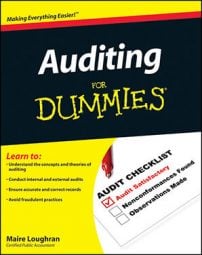The standard of professional conduct for the audit of all publicly traded companies comes from the Public Company Accounting Oversight Board (PCAOB). The Audit Standards Board (ASB) used to be the one-stop shop for all standards for nongovernmental audits. However, when the U.S. Congress passed the Sarbanes-Oxley Act of 2002 (SOX), the authority over audits of public companies shifted to the newly formed PCAOB. If your audit client is a public company, you follow PCAOB standards rather than ASB standards.
What’s the difference between the ASB and PCAOB standards? Not much — yet. In April 2003, the PCAOB adopted ASB standards on an interim, transitional basis. Frankly, it would have been an insurmountable task to immediately come up with a new set of standards.
Although some interim standards have been superseded, PCAOB and ASB standards are still quite similar. Any differences between the two are spelled out in guidebooks that contain GAAS, which are listed in the next section of this chapter. Another resource is the PCAOB Web site.
If you’ll be involved in auditing a public company, you need to keep the auditing standards cast of characters straight in your mind. Here’s a quick and dirty guide to the creation of SOX and the PCAOB:
The bankruptcies of Enron Corporation and WorldCom, Inc. (and the subsequent billions of dollars of investor losses) prompted the U.S Congress to pass the Sarbanes-Oxley Act of 2002 (SOX) in an effort to renew investor confidence in the regulation of publicly traded companies.
SOX in turn created a new watchdog of the public accounting and auditing profession: the PCAOB. The PCAOB is a private, nonprofit corporation charged with bringing a halt to the financial shenanigans on the part of corporate chief financial officers (CFOs) and chief executive officers (CEOs).
As part of this effort, PCAOB requires CFOs and CEOs to attest to the correctness of their companies’ financial statements. The teeth in this attestation is that the CEOs and CFOs are now subject to criminal penalties for incorrect financial statement representation.
Who oversees the PCAOB watchdog? The Securities and Exchange Commission (SEC) is charged with this task. The SEC’s mission is to make sure publicly traded companies tell the truth about their businesses and treat investors in a fair fashion by putting the needs of the investors before those of the company. The PCAOB Board of Directors consists of five members appointed by the SEC.
SOX requires that all accounting firms preparing or issuing audit reports on U.S. public companies register with the PCAOB.

